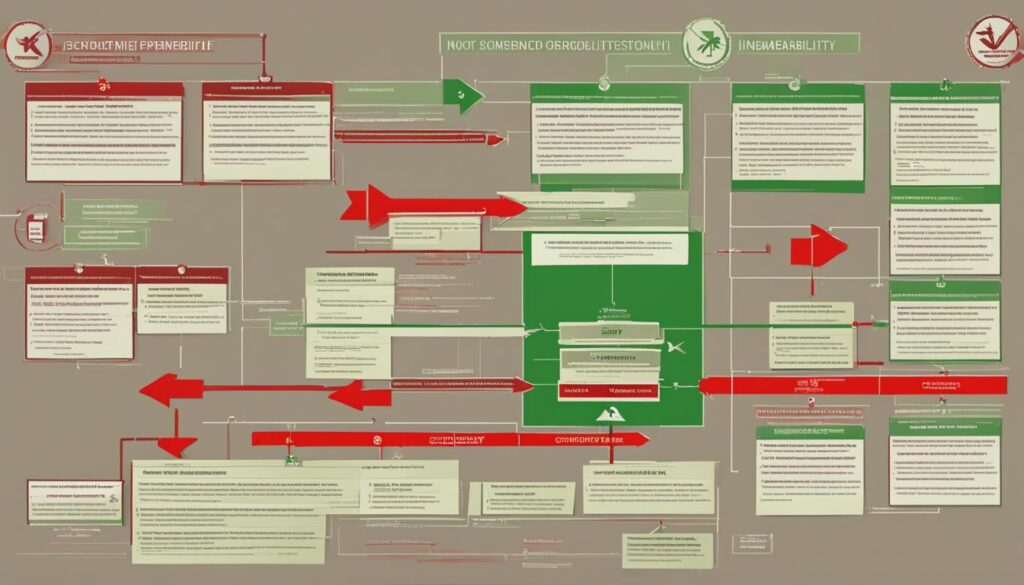Amidst the complexities of immigration law, individuals in Los Angeles without lawful permanent residency status may find themselves in dire need of respite from removal proceedings. The legal relief known as Cancellation of Removal for Non-Permanent Residents in LA stands as a beacon of hope, offering such individuals a chance to remain in the country under certain stringent eligibility requirements. This form of legal guidance requires a comprehensive understanding of the legal procedures and criteria applicable to their cases.
In this intricate landscape of laws and statutes, non-permanent residents aspiring for this relief must navigate through layers of regulatory requirements. It is a legal labyrinth where proficient legal guidance is not just beneficial; it is crucial for the successful adjudication of one’s case. Our discussion will delve into the essentials of eligibility, the relevance of continuous residence, and the importance of exhibiting good moral character—details paramount to potentially swaying the balance towards a favorable outcome.
As we explore the nuances of this pivotal legal provision, we emphasize the vital need for expert advice and representation. The journey through immigration law is fraught with challenges and intricacies that only seasoned professionals can adeptly navigate, ensuring that the rights and futures of non-permanent residents in LA are defended with the highest caliber of legal prowess.
Understanding Cancellation of Removal for Non-Permanent Residents
Individuals without permanent residency status facing removal from the United States find themselves in a precarious legal situation. The intricacies of immigration law require careful navigation, notably when one is applying for the cancellation of removal. This form of relief, while complex, offers a lifeline by allowing eligible non-permanent residents the chance to remain in the U.S. and ultimately adjust their status to that of a lawful permanent resident. It’s crucial for those facing the threat of deportation to comprehend the eligibility requirements, the critical role of continuous physical presence, and the implications of the stop time rule.
Eligibility Criteria for Cancellation of Removal
For those standing before an immigration court, the path to cancellation of removal is narrow and defined by stringent eligibility requirements. To qualify, non-permanent residents must demonstrate a set of specific criteria which include not only a prolonged stay in the country but also a consistent demonstration of good moral character. Convictions for certain offenses under the Immigration and Nationality Act (INA) can disqualify an individual outright, making legal guidance essential in navigating these requirements.
The Significance of 10 Years of Continuous Physical Presence
One of the pivotal eligibility requirements for cancellation of removal is the continuous physical presence of at least ten years in the United States. This does not merely involve residing in the country for a decade but maintaining a continuous presence. Any lengthy departures or reentries into the U.S. can lead to scrutiny and potentially disrupt the continuity needed for eligibility, thereby placing the burden of proof on the applicant to show unwavering presence within the country’s borders.
The Stop Time Rule Explained
The “stop time rule” serves as a critical provision, effectively freezing the accumulation of physical presence for the purposes of cancellation of removal. This provision is triggered by specific events, such as the issuance of a Notice to Appear (NTA) or the commission of an offense that disqualifies one from relief under immigration laws. The complexities associated with the rule are vast, with numerous nuances that impact eligibility. It takes expert navigation through these legal waters to understand how brief absences, reentries, or certain encounters with immigration authorities may affect one’s immigration status.

Adhering to these eligibility requirements is only the first step in a multifaceted process. Each component plays a significant role in determining the possibility of a non-permanent resident obtaining the right to remain in the United States. Skilled legal representation is recommended to effectively manage the application process within the stringent framework of immigration court proceedings.
The Role of Good Moral Character in Immigration Cases
Establishing good moral character (GMC) stands as a cornerstone in many immigration proceedings, particularly when an individual’s hope for remaining in the United States hangs in the balance. In the quest to secure a favorable immigration status, presenting a profile that epitomizes GMC to immigration courts is not just beneficial; it’s a legal necessity.
Defining Good Moral Character
What exactly constitutes good moral character within immigration law? The answer stretches beyond merely staying out of trouble with the law. GMC is the embodiment of values embraced by society, reflecting honesty, respect for the law, fiscal responsibility, and the willingness to contribute constructively to one’s community. The absence of criminal activities that can tarnish one’s reputation in the eyes of the law is pivotal. However, it’s the proactive demonstration of integrity and reliability that paints a complete picture.
Documenting Good Moral Character
Pinpointing evidence to support a claim of GMC requires a strategic amalgamation of official records and personal testimonies. Legal representation plays an instrumental role here, guiding individuals through the labyrinthine process of accumulating credible documentation. Whether it’s through tax compliance, community involvement, or upstanding work ethics, every piece of evidence consolidates the case for GMC, thereby offering a lifeline towards achieving desired immigration status.
Consider the following table to understand the kind of documentation needed to substantiate GMC within the context of immigration proceedings:
| Type of Document | Purpose | Impact on Immigration Case |
|---|---|---|
| Police Clearances | Indicates no prior convictions or ongoing criminal proceedings | Essential for determining eligibility, showcases compliance with law |
| Tax Records | Proves fiscal responsibility and contribution to society | Reflects on character and responsibility, often reviewed by authorities |
| Employment Records | Displays consistent and lawful work history | Signals stability and reliability, crucial for positive character assessment |
| Community Service Records | Demonstrates active and positive role in community | Supports claim of good moral standing, indicates altruism |
| Affidavits from U.S. Citizens | Serves as personal attestations to character | Adds weight to evidence through social proof |
Immigration status change, such as the one seeking cancellation of removal, is intricately linked to the concept of GMC. It isn’t merely about proving that one has avoided brushes with the law; instead, it’s about painting a cumulative portrait of oneself as a person capable of contributing positively and ethically to American society.

Grounds of Inadmissibility and Deportability for Non-Permanent Residents
In the pursuit of deportation defense, non-permanent residents must navigate the complexities of immigration law, particularly the grounds of inadmissibility and deportability that greatly influence their cases. Analyzing how certain criminal offenses impact an individual’s immigration status is crucial for those seeking relief such as cancellation of removal. Below, we explore how different criminal convictions may affect eligibility, potentially resulting in inadmissibility or deportability.
Crimes Impacting Eligibility
The Immigration and Nationality Act (INA) categorizes various offenses that could render a non-permanent resident inadmissible or deportable. Deportation defense lawyers must diligently assess if their client’s past actions may lead to negative immigration consequences. Let’s delve into specific crimes that jeopardize one’s ability to remain in the United States.
How Certain Offenses Affect Immigration Status
Criminal convictions can substantially alter the legal status of non-permanent residents, leading to potential inadmissibility or deportability. To illustrate, we provide a detailed breakdown of offenses that are particularly scrutinized under immigration law.
| Crime Category | Ideation | Consequence for Non-Permanent Resident |
|---|---|---|
| Aggravated Felony | Conviction of a serious crime, often with severe punishment | Typically leads to deportability and bars eligibility for most forms of relief |
| Crime of Moral Turpitude | Offenses demonstrating depravity or immoral conduct | Can result in inadmissibility or deportability depending on the circumstances and timing of the offense |
| Controlled Substance Violation | Violations concerning illegal drugs, excluding a single offense of simple possession of 30 grams or less of marijuana | Usually causes inadmissibility and may also lead to deportability |
| Firearm Offense | Illegal purchase, sale, possession, or any other commerce-related firearm activity | Often results in deportability from the U.S. |
| Domestic Violence | Crimes against a spouse, child, or any individual when a domestic relationship is involved | May lead to deportability, particularly with a conviction |
Assessing deportability and inadmissibility rests significantly upon the type of crime committed. For non-permanent residents, the implications of engaging in criminal activities extend far beyond the immediate legal repercussions, potentially influencing their chances of establishing a life in the United States. Understanding these distinctions is essential for effective deportation defense strategies.

Demonstrating Exceptional Hardship to Qualify for Cancellation of Removal
When pursuing cancellation of removal, non-LPRs face the intricate task of establishing that their deportation will result in “exceptional and extremely unusual hardship” to immediate family members, particularly those who are either lawful permanent residents or U.S. citizens. Unlike common challenges linked to deportation, exceptional hardship implies severe consequences disrupting the standard living conditions of the dependents involved. It encompasses hardships that are far from the general distress associated with removal from the country.
Proving exceptional hardship involves meticulous documentation and articulate legal argumentation, often necessitating the expertise of a skilled immigration attorney. Key areas of concern include, but are not limited to, significant health issues requiring continuous care in the U.S., financial dependency where the non-LPR is the primary provider, and educational interruptions for dependent children with special needs or strong community ties.

Below is an outline of the types of evidence that may support a case for exceptional hardship:
- Detailed medical records demonstrating ongoing treatment or special care needs of a U.S. citizen or LPR dependent.
- Financial statements evidencing the economic impact of the non-LPR’s removal on their family’s livelihood.
- School records and letters from educational institutions pointing to potential disruption in the schooling of children who are U.S. citizens or LPRs.
- Expert testimonies from social workers or psychologists detailing the potential psychological trauma inflicted upon U.S. citizen or LPR dependents.
The role of an immigration attorney cannot be overstated in this process, as they provide crucial guidance in identifying and presenting evidence that accentuates the severity of hardship. Collectively, these efforts aim to form a compelling narrative that meets the high threshold for what constitutes exceptional hardship, a criterion critical to achieving a successful outcome in cancellation of removal cases.
Navigating Legal Representation in Immigration Court
When facing the challenges of removal proceedings, the expertise of a seasoned immigration lawyer often becomes the linchpin of a successful defense strategy. In the intricate theatre of immigration court, the nuances and complexities of the law can prove to be overwhelming for individuals. Securing legal representation that not only understands the intricacies of immigration law but also has a profound experiential understanding of how courts handle these cases is indispensable.
Choosing the Right Immigration Lawyer
Finding a qualified immigration lawyer is one of the most vital steps a non-LPR can take to bolster their case. Your attorney should possess a comprehensive knowledge of immigration legislation, norms, and case laws that could potentially impact your case. Equally important is their track record and experience in removal proceedings, which can give you insight into their capability to navigate and potentially sway the outcome in your favor.
The Importance of Legal Representation in Deportation Defense
Quality legal representation is not a luxury but a necessity in deportation defense, particularly given the stakes involved in removal proceedings. An adept attorney can examine the entirety of your case from a legal perspective, identifying the strengths to leverage and the pitfalls to avoid, thus ensuring that your defense is both compelling and legally sound.
| Service | Benefits |
|---|---|
| Case Assessment | A thorough analysis of your case to formulate a robust defense strategy. |
| Legal Advocacy | Zealous representation in court to protect your rights and interests. |
| Documentation Preparation | Accurate and timely submission of all necessary legal documents and evidence. |
| Negotiation with Prosecutors | Seeking the best possible outcome through strategic negotiations. |
| Appeals and Motions | Filing of necessary appeals or motions for relief from removal. |
The Impact of Annual Caps on Removal Proceedings
Under immigration law, the annual cap is a critical factor that directly influences the processing of applications for the cancellation of removal and adjustment of status. Instituted by the government, these caps set a limit on the number of cases to be addressed within a fiscal year, which in turn can significantly extend the waiting period for non-Lawful Permanent Residents (non-LPRs).
The challenge presented by the annual cap cannot be overstated. With a fixed number of cases granted each year, the queue for those awaiting resolution on their cancellation of removal grows, leading to heightened anxiety and uncertainty. Applying early in the fiscal year could potentially improve one’s chances of being included before the cap is reached. However, it also places immense importance on the accuracy and completeness of each application, as errors or omissions could result in delays beyond the control of the applicant.
Cognizant of these constraints, judicial and administrative bodies handling immigration law must prioritize cases while ensuring that the merits of each application are judiciously reviewed. The balance between maintaining order in the system and securing justice for individuals seeking relief from deportation is delicate, and the annual cap is at the heart of this conundrum.
In light of these limitations, applicants are advised to seek competent legal counsel early in their application process. Knowledgeable attorneys are able to navigate the complexities of immigration law, offer strategic guidance and appropriate timing, as well as providing a thorough review of all documents before submission, thereby mitigating the risk of additional delays caused by the annual cap.
To illustrate the impact of the annual cap, consider the scenario during the last fiscal year:
- The cap for cancellations of removal reached its maximum limit only six months into the fiscal year.
- Applicants filing after the cap was met faced uncertainty, waiting for the commencement of the next fiscal year to have their case considered.
- Those who filed with errors due to haste, in an attempt to beat the cap, suffered further postponements – highlighting the necessity for a meticulous application process.
Ultimately, it remains clear that regular monitoring of the current cap status and a well-prepared application are integral to more favorable proceedings for non-LPRs seeking an adjustment of their status. Understanding and navigating around the annual cap is just one instance where the intricacies of immigration law come into stark relief, demanding attention to detail and proactive measures.
Key Steps for Applying for Cancellation of Removal for Non-Permanent Residents in LA
The pathway toward attaining cancellation of removal in Los Angeles requires a structured approach to the application process. As such, familiarity with the Immigration Court requirements and the preparation of a substantial array of supporting documents are critical.
Preparing Your Application
To begin the application for Cancellation of Removal for Non-Permanent Residents in LA, one must meticulously complete EOIR-42B form. This form is instrumental in the process and necessitates detailed personal information, a thorough account of your presence within the United States, and substantiation of your good moral character over the prescribed period.
Submitting Evidence and Supporting Documents
Compiling supporting documents is an intricate part of the application process. These should unequivocally evidence your claims of continuous residence and moral conduct. Include police clearances, tax returns, and employment records to fortify your case.
| Document Type | Purpose | Details Required |
|---|---|---|
| Affidavits from Community Members | To demonstrate good moral character | Should include details of the relationship to the applicant and instances exemplifying the applicant’s character. |
| Employment History | To prove continuous physical presence | Should contain all relevant dates, locations, and positions held over the 10-year period. |
| School Records | To support the claim of presence and good moral standing | Must list the educational institutions attended and any certifications or accolades received. |
| Medical Records | Evidence of hardship to family members | Should document any serious health conditions of dependent family members and how these would be exacerbated by the applicant’s removal. |
Attention to detail is paramount, and the accurate completion of documents can significantly impact the success of your application. With thorough preparation and a strong compilation of supporting documents, one can enter the Immigration Court with confidence.
Changes in Immigration Law Affecting Non-Permanent Residents
Regulatory amendments in the realm of immigration policies are a constant in the United States, impacting the immigration status and lives of non-permanent residents. These changes can arrive swiftly, influenced by shifts in political climate, legal interpretations, or as responses to pressing social and economic needs. Understanding and navigating these changes is vital for individuals seeking to remain in the country, particularly for those who may be facing removal.
While legislative developments can be unpredictable, key aspects such as changes to eligibility criteria for certain immigration benefits, adjustments to application procedures, and alterations to enforcement priorities can have direct consequences. Such changes can redefine pathways for remaining in the U.S., affirming the importance of staying well-informed and consulting with knowledgeable immigration law professionals.
Recent history has shown that reforms can either open doors or create additional hurdles. For example, the introduction of stricter rules may heighten the requirements for proving “extreme hardship,” thus affecting the success rate of cancellation of removal applications. Alternatively, positive revisions to immigration policies may offer provisional programs that can afford non-permanent residents temporary protection from deportation and a chance to apply for a work permit.
The following list highlights the types of changes in immigration law that could affect non-permanent residents:
- Adjustments to the definition of “good moral character” and offenses that disqualify non-permanent residents from certain immigration benefits.
- Modification in the recognized duration that constitutes “continuous presence” within the United States.
- Shifts in the interpretation of “exceptional and extremely unusual hardship,” which can dramatically impact the outcome of cancellation of removal cases.
- Policy changes in the detention and deportation prioritization of non-permanent residents with pending immigration applications or appeals.
In light of the fluid nature of immigration regulations, non-permanent residents and their advocates must keep abreast of the latest legislative measures and executive orders. Leveraging the expertise of a seasoned immigration attorney can make a substantial difference in understanding these legal shifts and providing the best possible defense against removal.
Staying vigilant about the latest in immigration policies is not just advisable, but a necessary strategy for non-permanent residents and their families to maintain stability and maximize their opportunities within the United States.
Gathering Evidence to Support Your Cancellation of Removal Claim
In the quest for Cancellation of Removal for Non-Permanent Residents in LA, evidence collection is the cornerstone of building a robust legal defense. The task at hand is not just to collate any documents or statements, but to amass evidence that unequivocally substantiates statutory compliance on three fronts: physical presence, moral character, and exceptional hardship to family members. Such exacting requirements command the guidance of a skilled immigration attorney, as this can significantly impact the outcome of your case.
Types of Evidence to Collect
When considering the evidence necessary for such a claim, attention must be focused on specific documentation. Verifiable proof of continued residence over the prerequisite period, conduct records affirming good moral character, and detailed records that illustrate the detrimental impact your removal would have on immediate family members are indispensable. This evidence typically includes employment history, tax filings, medical reports, educational records for children, and sworn declarations from community members.
Strategies for Presenting Your Case Effectively
To present cases effectively, an immigration attorney in LA will advise you to prepare a narrative that aligns with your evidence, emphasizing coherency and cogency in every segment of the argument. Each piece of evidence should be presented not just as a standalone document but as part of a comprehensive narrative that collectively builds a convincing case for why a cancellation of removal should be granted. Ultimately, your preparation and precision in providing evidence can be a deciding factor in the eyes of the court.
FAQ
Q: What is Cancellation of Removal for Non-Permanent Residents?
A: Cancellation of Removal is a form of immigration relief available to certain non-permanent residents who are subject to removal from the United States but wish to adjust their status to that of a lawful permanent resident. This relief is contingent upon meeting specific eligibility requirements under Immigration and Nationality Act (INA) § 240A(b)(1).
Q: Who is eligible for Cancellation of Removal in LA?
A: Non-permanent residents in Los Angeles may be eligible for Cancellation of Removal if they meet the following criteria: at least 10 years of continuous physical presence in the U.S., a showing of good moral character during those years, no convictions for certain offenses, and proof of exceptional and extremely unusual hardship to a U.S. citizen or lawful permanent resident family member in the event of removal.
Q: What is meant by 10 years of Continuous Physical Presence?
A: To satisfy this criterion for Cancellation of Removal, a non-permanent resident must have resided in the U.S. continuously for a minimum period of 10 years. Physical presence must be maintained without significant interruptions or departures from the country.
Q: How does the Stop Time Rule affect eligibility?
A: The Stop Time Rule halts the accumulation of continuous physical presence when the individual receives a Notice to Appear or commits an offense that renders them inadmissible or deportable under certain sections of the INA. This rule is crucial in determining a non-permanent resident’s eligibility for Cancellation of Removal.
Q: What constitutes Good Moral Character in immigration cases?
A: Good Moral Character (GMC) is an important factor in the evaluation of a Cancellation of Removal case. It typically includes adherence to the law, maintenance of family ties, payment of taxes, and overall contribution to the community. Absence of convictions for crimes that demonstrate poor moral character is necessary.
Q: How are Crimes impacting eligibility for Cancellation of Removal?
A: Criminal offenses, particularly those involving moral turpitude, drug violations, and aggravated felonies, can disqualify a non-permanent resident from receiving Cancellation of Removal due to grounds of inadmissibility or deportability as established by immigration law.
Q: What evidence is required to demonstrate Exceptional Hardship?
A: To demonstrate exceptional hardship, the non-permanent resident must provide substantial evidence indicating that their U.S. citizen or LPR family members would suffer significantly more than the usual hardships expected during deportation. This can include medical, educational, financial, or other compelling documentation.
Q: Why is selecting the right Immigration Lawyer important in LA?
A: An experienced immigration lawyer can provide essential guidance and competent representation in immigration court. They can help navigate the complexities of immigration law, aid in preparing a strong defense against deportation, and bolster the chances of achieving a positive outcome.
Q: What is the impact of the Annual Cap on Removal Proceedings?
A: The U.S. government sets an annual limit on the number of Cancellation of Removal cases and adjustments of status that can be granted. Once this cap is reached, no additional cases can be approved during the fiscal year, leading to potential backlogs and delays.
Q: What are the steps for applying for Cancellation of Removal?
A: The application process involves completing detailed forms such as the EOIR-42B, gathering comprehensive documentation to prove continuous presence and good moral character, submitting biometric data for applicants aged 14 years and older, and ensuring all paperwork is properly filed with the immigration court.
Q: How can Non-Permanent Residents stay informed on changes in Immigration Law?
A: Non-permanent residents should keep abreast of changes in immigration policies by consulting with an immigration attorney, regularly checking updates from official government sources, and subscribing to immigration law news outlets.
Q: What types of evidence should be collected to support a Cancellation of Removal claim?
A: The types of evidence generally include affidavits, employment records, tax returns, school records, medical documents, and any other materials that can attest to the individual’s continuous physical presence, good moral character, and the exceptional hardship that family members would endure if deportation occurs.
Q: What strategies are effective for presenting a Cancellation of Removal case?
A: Effective strategies involve thorough preparation of the case, collection and organization of reliable evidence, persuasive legal argumentation, and, when possible, securing testimonies from witnesses who can support the claims of the non-permanent resident. Legal representation from a specialized immigration attorney is also a critical component for success.

